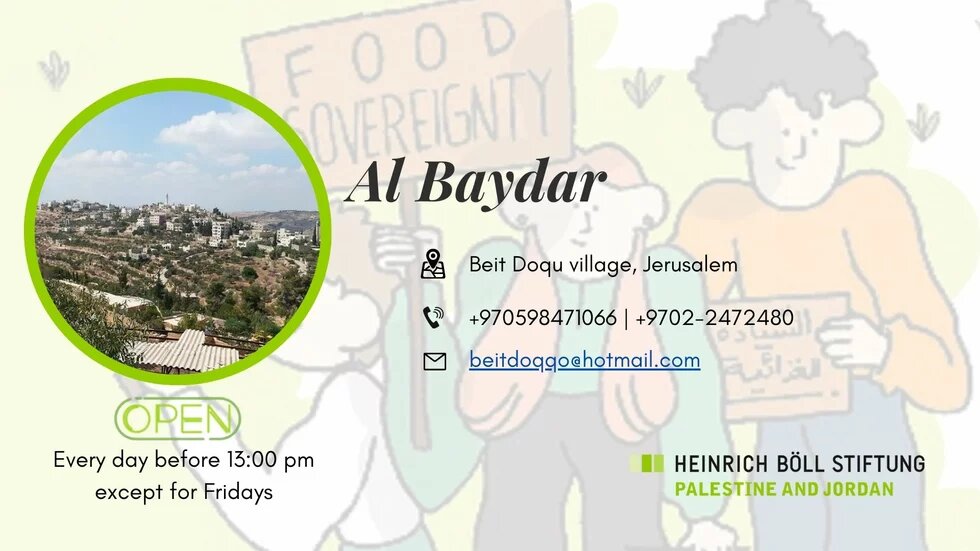
Beit Doqu is a beautiful village northwest of Jerusalem with 2,000 inhabitants and a scenic location overlooking breath-taking hills and terraces. The illegal Israeli settlements are the only eyesore in sight and sadly the occupation has rendered this beautiful village a dead-end location, where its roads lead nowhere but to the Segregation Wall or to settler only by-pass roads. With a long history of being an agricultural village, Beit Doqu used to export its famous grapes to the Gulf States, especially Kuwait.
The village’s golden age of agricultural production was brought to an end as the village was severely impacted by the confiscation of vast lands since the 80s. Consequently, agriculture was abandoned for work in settlement construction. In 2003, as the Segregation Wall snaked its way through the village’s lands, permits to work in the ‘48 areas were no longer issued, and locals returned to the land. Much of the work of the Beit Doqu Development Society, which was established in 1987, was focused on the rehabilitation of lands. Now, the Society, through its work with local farmers and NGO partnerships, has managed to rehabilitate over 2,000 dunums of land for farming. Al-Baydar is the food production arm of the Society and focuses on the production of preserved foods.
The difficulty in marketing the large amount of the produce that the village returned to grow shifted the focus to food processing. The produce includes grapes, figs, peaches, tomatoes, cucumber, cabbage, and peppers. The idea was to start a line of dried, pickled, and other preserved products, in order to avoid huge losses due to checkpoints, marketing restrictions, or market surplus, which harms many Palestinian farmers. The Society and women’s cooperative produce mouth-watering sun-dried tomatoes, prepare grape molasses (dibs), and process other vegetables and herbs, helping local farmers to profit from the productivity of their land. Additionally, Al Baydar’s work now mainly focuses dairy products, which constitutes 90% of their production, while the remaining 10% is naturally preserved food.
The Development Society has also started rehabilitating lands designated as Area C under the Oslo accords, which are highly restricted by the Israeli army. They set up training sites to encourage and educate farmers on organic production, compost, and biological pest control. In essence, the farmers realized that returning to traditional methods of farming has its benefits and is in demand in the local market. The cooperative’s vision is to establish their own organic shop that would sell fresh produce and preserved foods for the local and international markets. Farmers sell their produce in Hisbet Ramallah (central vegetables market), and they deliver orders of fresh and processed foods to Ramallah. They also sell their produce through Sunbula and Adel Fairtrade .
____________________________________________________
Production Season: Production of dairy and pickles takes place year-round.
Product Availability: You can find Al Baydar products at supermarkets in Ramallah and through Subula and Adel Fairtrade.
Products Selling Points:
- In Mazare’ Nobani Village.
- Per order.
- Farfahina Store, Surda,main road.
Other services: They offer a tour of Beit Doqu village.